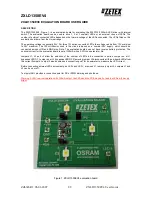
Chapter 1: Introduction
1-17
Introduction
Wake-On-LAN (WOL)
Wake-On-LAN is defined as the ability of a management application to re-
motely power up a computer that is powered off. Remote PC setup, up-
dates and asset tracking can occur after hours and on weekends so that
daily LAN traffic is kept to a minimum and users are not interrupted. The
motherboards have a 3-pin header (WOL) to connect to the 3-pin header on
a Network Interface Card (NIC) that has WOL capability. Wake-On-LAN
must be enabled in BIOS. Note that Wake-On-Lan can only be used with an
ATX 2.01 (or above) compliant power supply.
1-6
Power Supply
As with all computer products, a stable power source is necessary for
proper and reliable operation. It is even more important for processors that
have high CPU clock rates.
The SUPER P3TDE6/P3TDER accommodate ATX power supplies. Although
most power supplies generally meet the specifications required by the CPU,
some are inadequate. You should use one that will supply at least 300W of
power - an even higher wattage power supply is recommended for high-
load configurations. Also your power supply must provide a +5V standby
voltage that supplies at least 720 mA of current. Also, for the P3TDE6, 1.5A
is needed for LAN1 and LAN2.
It is strongly recommended that you use a high quality power supply that
meets ATX power supply Specification 2.02 or above. Additionally, in ar-
eas where noisy power transmission is present, you may choose to install
a line filter to shield the computer from noise. It is recommended that you
also install a power surge protector to help avoid problems caused by
power surges.
1-7
Super I/O
The disk drive adapter functions of the Super I/O chip include a floppy disk
drive controller that is compatible with industry standard 82077/765, a data
separator, write pre-compensation circuitry, decode logic, data rate selec-
tion, a clock generator, drive interface control logic and interrupt and DMA
logic. The wide range of functions integrated onto the Super I/O greatly
reduces the number of components required for interfacing with floppy disk
drives. The Super I/O supports 360 K, 720 K, 1.2 M, 1.44 M or 2.88 M disk
drives and data transfer rates of 250 Kb/s, 500 Kb/s or 1 Mb/s.It also
Summary of Contents for SUPER P3TDE6
Page 1: ...SUPER P3TDE6 SUPER P3TDER USER S MANUAL Revision 1 0c SUPER...
Page 9: ...Chapter 1 Introduction 1 3 Introduction Notes...
Page 10: ...SUPER P3TDE6 P3TDER User s Manual 1 4 Introduction SUPER P3TDE6 Figure 1 1 SUPER P3TDE6 Image...
Page 11: ...Chapter 1 Introduction 1 5 Introduction SUPER P3TDER Figure 1 2 SUPER P3TDER Image...
Page 52: ...3 6 SUPER P3TDE6 P3TDER User s Manual Notes...














































